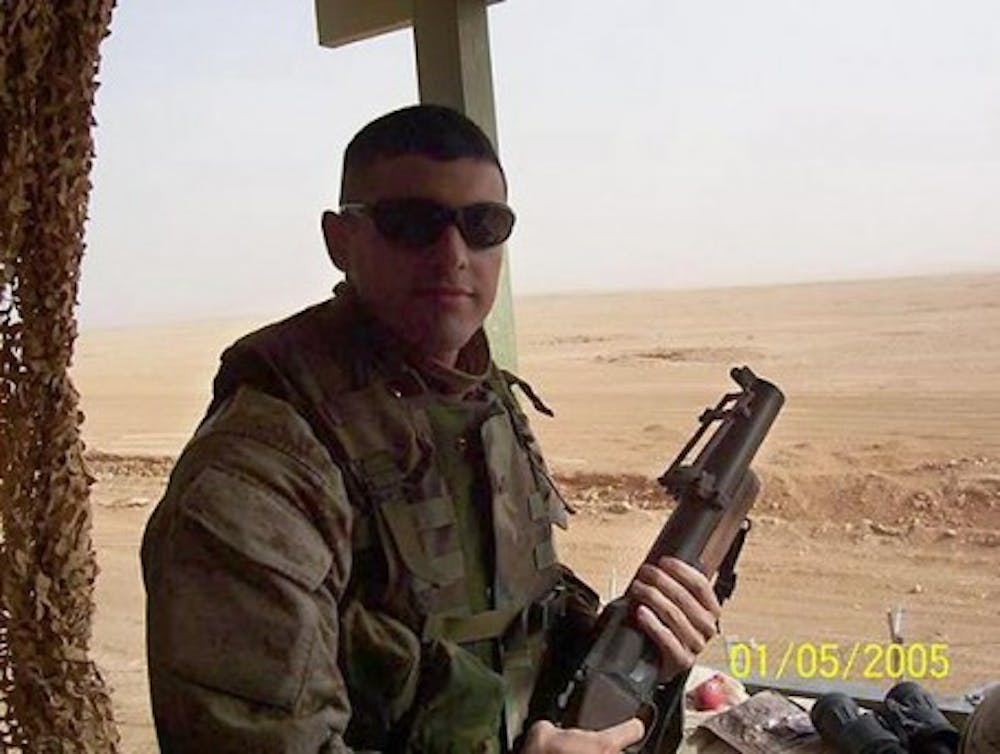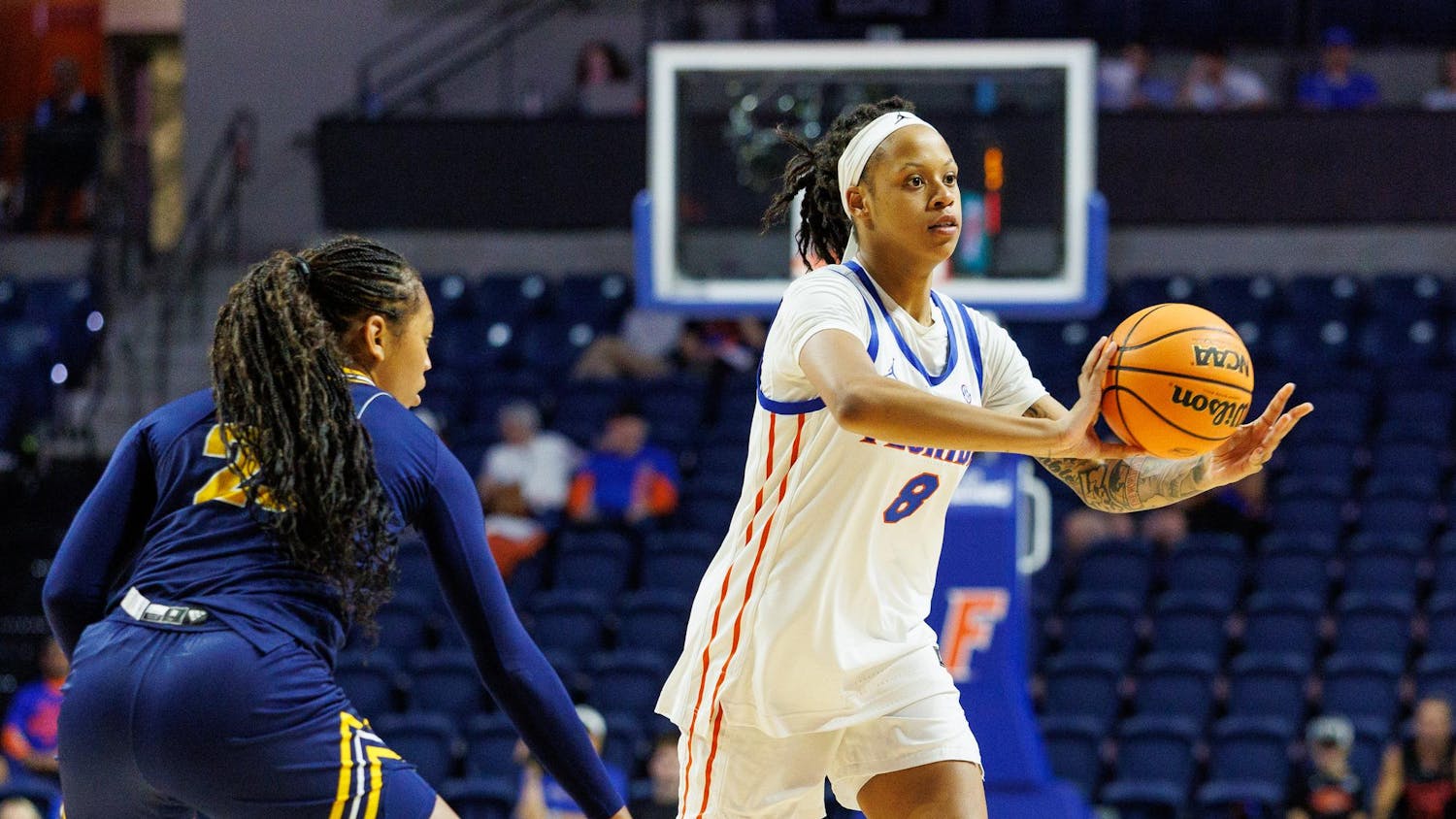Editor's Note: This is the final story in a three-part series on students who completed military service in the Middle East. The first stories ran Tuesday and Wednesday.
Eduardo Gonzalez's journey to Iraq began when he joined the Marines a month before Sept. 11, 2001. And after several road bumps - he was greeted on his arrival day by a shower of rockets and celebrated his birthday alone - his trip has ended at UF, where he will complete his officer training.
"I moved to Florida to become a Gator," said Gonzalez, a Marine sergeant in the ROTC and a senior finance major at UF. "I've been all over the world with the Marines, but I love living in Gainesville. It's been nothing but a positive experience for me."
Gonzalez, a UF transfer student, said he joined the Marines because his life was lacking discipline.
He had been enrolled in the University of Houston in 2001 and was not doing well academically. He decided it was time for a change and enlisted in the Marines, one month before the terrorist attacks of Sept. 11.
"The moment I stepped into the recruiter's office, I knew I wanted to be a Marine," Gonzalez recalled. "It was a very spur of the moment decision. But it was a good decision."
After finishing basic training in Pensacola, and a two-year post in Okinawa, Japan, he was re-stationed in San Diego in 2004. But he was only in the United States for a month before he was sent to Iraq, where he would spend the next six months.
Constant Vigilance
He arrived in Iraq in the middle of the night and was warmly greeted by a rocket attack aimed at his base. Rocket attacks, like mortar attacks, are launched over the walls of the base usually from truck beds two to three kilometers away.
"That first attack freaked me out a little bit," he said. "After a while though, you just kind of get used to it. If it doesn't hit you, you just go about your business."
After his service started with a bang, Gonzalez settled into normal life at Al Asad Airbase, his base in Iraq. He described the location as "the middle of nowhere," but it's one of the biggest air bases in Iraq. His job was to keep a lookout for the base in a watchtower overlooking the desert. He worked every day in the tower for a six-hour shift.
He watched for anything unusual shifting in the sand. Non-military vehicles or a shepherd carrying a weapon were all subject for further investigation.
There was no running water on his base. He slept in a "tin can" of cheap aluminum with six other Marines in an area roughly half the size of a Wal-Mart shoe department. Trucks brought water to them when needed. When some of the water pipes got blown up in an attack, the base went without water for a few days. Some days, the convoys bringing in supplies would get attacked and the base would be without basic food supplies.
Gonzalez would get angry when other soldiers complained about the lack of food.
"People are out there dying to bring us food," he said. "And they want to complain about not having eggs. I just didn't understand that."
Like many others, Gonzalez celebrated Thanksgiving, Christmas and New Year's away from his family. But he also celebrated his 23rd birthday in Iraq in 2004, not that any of his fellow soldiers knew it had even happened.
"I didn't tell anyone it was my birthday," he recalled. "I don't even remember what happened. I just remember it was a bad day."
Danger Within the Walls
Another bad day on the base involved a car bombing at the outer gate. The base was patrolled by Iraqi policemen who performed routine maneuvers in front of the base, which made them easy targets. Gonzalez said 50 Iraqi policemen were killed in the blast.
They weren't the only Iraqis who faced problems at the base. Most U.S. military bases employ Third Country Nationals, who work on the base to send money to their families. Additionally, there are American and Iraqi vendors who work on the base in a marketplace area.
Some Iraqi vendors occasionally disappeared from their posts on the base. Gonzalez said it was often assumed they had to stop coming because either they or their families were being threatened.
"They often fall victim to fear or bribery," he said. "That's why we didn't interact at all with them. It was just too dangerous for all of us."
Gonzalez said that during changeovers, a time when the new soldiers are on base with the old soldiers, the base was mortared twice as often as it usually was.
An Officer's Education
Gonzalez believes that 99 percent of Iraqis just want freedom. He said they're just like us in that regard. He's willing to do what it takes to ensure that freedom for whoever wants it. That's why he came to UF: to become an officer. Through the Marine Enlisted Commissioning Education Program, he will graduate and become a Marine officer. Currently, he is on active duty in the ROTC. And he's two semesters away from reaching that goal. Even though he's sad to leave, he still has two more years of Marine flight school after he graduates.
"I needed a change and I needed discipline," he said. "I got that from my time in the service. I had no focus or direction. Now I'm doing great in school and have a good future ahead of me. I wouldn't trade this experience for anything."






